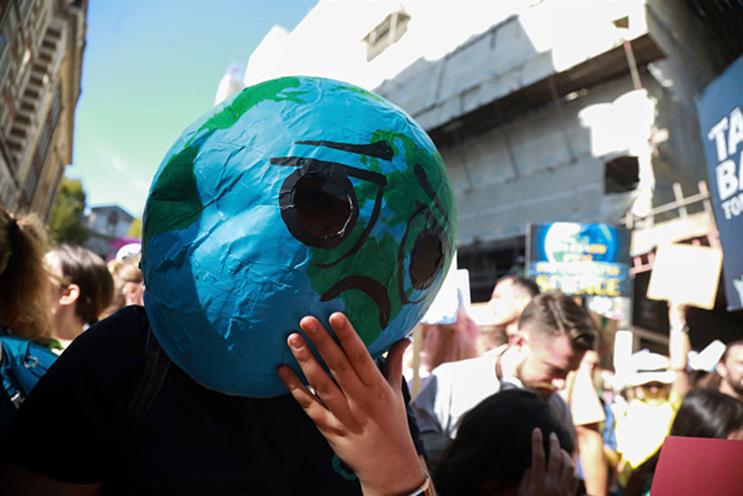
When environmental activist Greta Thunberg told the 2019 United Nations Climate Action Summit in New York on Monday that adults had stolen her childhood , she had a point.
The world is in crisis as a result of climate change and, instead of taking radical action to stop it, businesses around the world are adding to it – polluting the atmosphere with yet more carbon dioxide while too often paying lip service to targets that aren’t enforced.
It's complicated, but the truth is that advertising helps these companies grow. It's not a stretch to argue that adland is complicit in climate change because, by virtue of what it is paid to do, it helps to flog the consumer goods and services that emit greenhouse gasses and drain Earth's resources.
The advertising industry, though, has an opportunity to drive change – as the 80 creative and media agencies striking in London last Friday know. They joined millions of people from around the world in Thunberg’s Global Climate Strike, brandishing signs they designed
The climate movement has found in 16-year-old Thunberg a powerful figurehead and protests drive awareness – but actual meaningful change will not follow unless business leaders take a stand. Industry figures know this to be true, because understanding and influencing behavioural change is their bread and butter.
So this begs the question: are agencies morally responsible for the impact their clients have on the planet? And should agencies be willing to ditch high carbon-emitting clients?
Laura Jordan Bambach
Chief creative officer, Mr President
The climate crisis is the biggest challenge facing us globally and swift change is key. As agencies, we have a responsibility to have tough conversations with our clients about emission reduction and how they can do the right thing for both their brands and the planet.
Should we refuse to work with them? At Mr President, we’re looking at how we can play a more active role in reducing emissions by collaborating with our clients. To create change we need to be part of the solution, not just shut ourselves out – that’s counterproductive. What is absolutely necessary is to make sure we’re aware of both clients' emissions and our own supply chains, so that we can make more informed decisions, including those to do with current and potential new partnerships.
Ben Middleton
Chief creative officer, Creature
At Creature, we nailed our colours to the mast for all to see and they're as green as the Hulk's shredded abs. Helping the Green Party fight the good fight has not only kept us all in rude moral health, but it’s allowed us to make some of our best work.
It doesn’t get much better than working with a client whose mission is to literally save the planet. With this in mind, we’ve always loved working with brands that have values that align with one of our own: leave the world better than you found it.
Neil Christie
Managing director, Wieden & Kennedy London
We’re part of the capitalist system that encourages growth and consumerism. But that doesn’t excuse us from taking responsibility for our actions. Part of our job must be to help clients see that aligning their business goals with addressing climate change must be a priority and that positive action can bring them a brand advantage.
It’s up to each agency to make its own decisions – if they’re independent enough to be able to do so. We have in the past declined invitations to work with clients on ethical grounds. It’s not helpful to blame companies for their historical behaviour but – now that we know what we know about the climate emergency – I can see that we might choose not to work with a client that has no intention of addressing their responsibilities from this point forward.
 Ash Bendelow
Ash Bendelow
Managing director, Brave
To claim moral responsibility is a step too far – to say agencies are complicit is perhaps closer to the truth at times. Where possible, we try to support our clients to incorporate more sustainable methods by, for example, offsetting flight carbon emissions in the production of ads. We can equally help them to create initiatives and implement more climate-savvy messaging that nudges consumers to be more eco-friendly.
This is fine for brands who have sustainability at their hearts, but what about others who don’t? This can be a substantial moral quandary, not least for my staff, who may have strong views on the issue. Going home at night knowing you’ve created work that doesn’t reflect reality is reprehensible. If a client is doing bad while claiming good, we have a responsibility to address that. If we ignore this, then yes, we are vicariously complicit.
If our industry is going to tell other people how to live, it needs to demonstrate its own commitment to change. Advertising agencies need to practise what we preach on behalf of our clients. We want our creatives to be able to express their climate concerns through the work they produce. We want to work with environmentally savvy organisations and, often, we find the same reflected back at us. We know we’re not perfect. Like most agencies, we’ve made a start, but the issue is complex and there is a long way to go for all of us. It’s only by working together, rather than ditching clients, that we can drive that change.






.jpg)
.jpeg)
